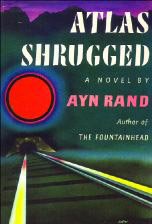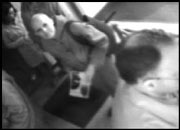Dorothy Allison is a short, sturdy, strident dyke known mostly for a novel called Bastard Out of Carolina. A coming-of-age home-is-where-the-heart-is psychosexual Southern-gothic something-or-other, Bastard Out of Carolina (a finalist for the National Book Award in 1992) is Allison’s not-exactly-idyllic autobiographical tale of growing up in a wild, lush place where everyone is dirt-poor and incest happens. (The book climaxes with a scene in which the young narrator’s stepfather rapes her. Then the narrator’s mother has a my-husband-or-my-daughter moment, and makes the wrong choice.)
Allison, visiting Bailey/Coy Books last week to promote her newly expanded story collection, Trash, said that she grew up in an “enormous, trashy, crazy, pickup-driving, shoot-each-other family” and that she has long thought of it as her “responsibility to bring in characters I rarely see in other people’s writing”—namely, poor white trash. What resonates most in her work—even more than her harrowing history of sexual abuse and her maturation into lesbianhood—is the socioeconomic stuff, the class anger.
However, whether because her impression was that Bailey/Coy is a “gay bookstore” (please), or because she looked out into the womynly audience and decided to do it up (she would confess later that she saw lots of “hot women” in the crowd)—whatever her reason, she decided not to talk about class or anger but, instead, to completely dyke out.
She took long, strange glances around the room (“I’m cruising for all my ex-girlfriends”), said vague things about children (“I like little girls—they’re the hope of the future”), and described finding girl-on-girl pornography under her father’s bed (“A couple of things I tried later turned out not to be physically possible. Knowledge comes from the strangest places”). Then she read a story from Trash in which two women have sex on a table in a research laboratory full of caged monkeys. She read: “‘Oh, fuck me. Goddamn it! Fuck me!’ I begged. Toni slid me to the edge of the table until my head hung off and my hair swept the floor. When her fingers opened my cunt and her teeth found my breast, I started to scream and the monkeys in the wall cages screamed with me.”
The New York Times has praised her for her “unassertive, cumulative lyricism” and her “language for the direct articulation of deep and complex feelings,” but last week she was apparently in no mood for depth and complexity. (Later she would say that all she looks for in a book anymore is “some good sex and happiness.”) So when some wanker raised his hand and said, “The monkey is obviously a metaphor for something,” Allison just looked at him and said, “It is? OK, this is a pop quiz. Everybody get out some paper and your shiny black pens and make me a list of what monkeys could be a metaphor for.”
Allison is at work on another novel that is, for whatever reason, taking forever. (Actually, here’s the reason: She currently has a “good” but “demanding” lover and a 10-year-old son—whom she says, if her confessional novel karma rubs off, “will grow up to write a novel about a sensitive young man raised by two brutal lesbians.”) But what Allison wants most right now, she said, is “to be a role model for other little girls running around—to walk into town and be the face of the women’s movement.”
“You’re doing it for me, babe,” a heavyset woman shouted back. Then applause happened.







